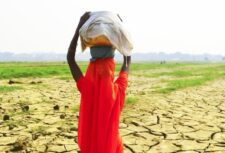Disclaimer: This article is more than 14 years old, and may not include the most up-to-date information or statistics. Please verify information with more recent sources as needed, and if you have any questions contact our Press Office.
11 January 2010
The two days of rioting in Rosarno, in the Calabria region of southern Italy, have revealed fruit pickers in conditions of slavery, according to the International Organisation for Migration.
The rioting by dozens of migrant workers followed attacks on 7 January by local residents on African farm labourers. More then 50 people were injured during the riots and 10 locals and migrants were arrested before authorities evacuated more than a thousand African workers to detention centres.
Flavio Di Giacomo, the International Organisation for Migration’s spokesperson in Italy, said: “This event pulled the lid off something that we who work in the sector know well but no one talks about: That many Italian economic realities are based on the exploitation of low-cost foreign labour, living in subhuman conditions, without human rights. It’s shameful that this is happening in the heart of Italy.”
Many of the African workers paid middlemen up to $10,000 for the promise of properly paid and legitimate seasonal work in Italy’s agriculture sector but instead found themselves earning 15-25 euros for a 12-hour-shift.
Workers were also expected to pay for basics, including transport and water, with some losing up to quarter of their total earnings in payments to the local Calabrian Mafia known as the ‘Ndrangheta.
Joanna Ewart-James, Anti-Slavery International’s Supply Chain Co-ordinator said: “Typically the extortionate costs demanded by middlemen are offered to migrant workers as loans. On taking up the offer the workers are usually promised decent wages which will enable them to easily repay their loan. However, those paid significantly below the legal minimum wage with large loans and high interest rates can quickly fall into conditions of debt bondage, trapped in to a situation where they are unable to repay the debt.”
An estimated 20,000 migrants work as seasonal labour in the farms of Calabria, but only 6,000 have regular visas. An IOM report from 2009 said illegal labour, especially in the agricultural sector, accounts for between 15.9 per cent and 17.6 per cent of Italy’s gross domestic product.





